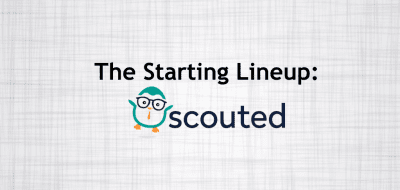Welcome to our first interview/post in a series we are calling The Starting Lineup: Stories and advice from early stage startup employees. In these interviews, we will be chatting with people who were some of the first hires at their startup. We wanted to go beyond interviewing startup founders and hear a different perspective from the people who helped build the foundation of some amazing companies. Hopefully you will be able to learn from some incredibly interesting people and read about what it’s like to work at an early stage startup! So be sure to subscribe to our blog to stay updated on all The Starting Lineup interviews we have coming up!
First up we are going in-house as we interview Ian Robert who was the second hire here at Scouted. He goes into detail about the struggles, triumphs, and lessons he has experienced as a recent college grad working at an early stage startup.
Also on Mediabistro


General Questions/Bio:
Name: Ian Robert
Company: Scouted
Founders: Jacqueline Loeb and Robin Levine
Role: Head of Growth/Marketing
Employee/Hire #: 2
How big is Scouted: 10 people
How long have you been at Scouted: Just under 2 years
What does Scouted do: Scouted is an algorithm based job matching platform that helps companies make better entry-level hiring decisions
In-Depth Questions:
Q: How did you find/hear about Scouted?
A: That’s a funny story, I first heard about Scouted in early 2015 when I was still in college. Back then it was known as Snap! (the name has changed thanks to you know who…) I received an email from Jax and Robin saying I should sign up for this cool job/internship platform called Snap! At the time I was still looking for a Summer internship so I said why the hell not I’ll give this seemingly sketchy company my info. I only say sketchy because you know classic MVP/startup they were using Google Forms to capture my information and job preferences. Well little did I know submitting my info on this random ass Google Form would change my life… That Summer I received 2 internship offers from startups thanks to Snap! I ended up interning for RedOwl Analytics in San Francisco (recently acquired by Raytheon) and had the time of my life.
Q: Why did you in that moment realize you wanted to work at Scouted/with the founders (Robin/Jax)?
A: After interning in San Francisco I returned to college for my senior year, I kept up with Jax and Robin as they helped me with my job search. Towards the end of the year I had a couple of offers in hand from some larger startups but nothing that really excited me. So I continued the dialogue with Jax and Robin as they helped me navigate the job search. This is really when I started to realize I wanted to work for Scouted/Jax and Robin. These two people were so dedicated to helping me find a job/career even at companies that were outside of the Scouted network that it really rubbed off on me. They were such genuine people who wanted only the best for candidates, they had created a product and service that was very high-touch and engaging with candidates. Which is something that has been lost in the job search process. Its funny to think that I had only corresponded with them via email and phone yet they were so engaged in helping me find a job. Anywho, as I talked with them more and more the conversation started to shift from where I wanted to work to working at Scouted, bada bing bada boom, next thing I knew I was working for a 5 person company…
Q: Why did you want to join an early stage startup?
A: I had interned at larger companies in the past, but after interning for a startup and living in San Francisco it was rather eye-opening. I lived and interacted with people who were working at a number of early-stage startups and it was truly inspiring to see how much they cared about their company, product, and vision. I wanted that same feeling, where I could work 60, 70, 80 hours and still feel inspired by the work I was doing because of its impact on a business/vision. This developed into me wanting to work somewhere where I felt as though my work was valued. Especially at an early stage startup the work you’re doing has incredible implications on the business. Also, watching Silicon Valley definitely had an impact…
Q: What were you hired to do and how has your role changed over time/as Scouted grew?
A: So I was hired as a Growth Associate, essentially my role was to manage candidate/user acquisition. Essentially I was to acquire as many users at the top of the funnel while ensuring that our cost of acquisition went down. Over time I sort of became a jack of all trades… I did a lot of operational stuff, did some sales, and worked a lot on our product. Today my role is still evolving, I am our Head of Growth. I manage our client and candidate acquisition at the top of the funnel, work on ensuring users are able to move the funnel in an efficient and effective manner, and I use analytics tools to find the most effective channels of acquisition. Excusing all the fancy language I essentially work on marketing, strategy, operations, data analysis, and product.
[optinform]
Q: What was the hardest challenge you/Scouted faced when you first started?
A: At a personal level I would say, I knew more or less what I was getting myself into… One quote from Jax really resonated with me and really held true in my case. She said during my final interview before deciding to work at Scouted “the first month or so you’re not really going to know what you’re doing and that’s fine, but after that month it is going to be like someone shoved a firehose in your mouth.” That first couple of months I didn’t have a clue in the world as too what I was doing… Which frustrated me, it felt as though I wasn’t accomplishing anything. Finally, once I had my feet on the ground, that is when the firehose started, it felt as though I was doing a million different things at once. The combination of feeling absolutely helpless then feeling as though I didn’t have enough hours in a day was mind-boggling. It took time to adapt, but it was an incredibly valuable learning experience. It not only humbled me, but it helped me learn how to “learn”, prioritize, and ask for help. Learning those things early on in my time at Scouted have only paid off in the long run.
Q: What is the biggest change that you have seen/experienced while at Scouted?
A: Definitely not the coolest thing in the world, but I would have to say operation workflows. Now, what do I mean by that? Essentially it’s things like knowing how to handle a situation when a candidate asks a question, or who should we tell when we find a problem on the platform. It’s one of those things when you’re at an early stage startup where you’re not only doing a million things, but you also have to track those million things… There is no playbook, more times than not you’re doing something for the first time in company history or you’re the only one who knows how to do it. As time goes on tracking all those things started to pay off, it became easier for people to pick up and understand how things work or know who to ask. We are by no means perfect yet with a 100-page company handbook, but I have noticed a considerable difference in the 2 or so years I have been here.
Q: Has there been a defining moment(s) in your time at Scouted that you really remember?
A: Data. I know super nerdy and vague. But when we finally had a better grasp of the massive quantity of data we have stored it changed the way decisions were made. Myself and our tech team spent month’s implementing new metrics dashboards and Mixpanel (Amazing tool for any marketer/founder) Finally in October of 2017 we had a way to essentially access any interaction or piece of data. This to me was an incredible moment, it not only changed the way we were making marketing decisions, but the product and business decisions as well. Going forward we are now a more data-driven team that is able to understand what is happening within our business, users, and platform. Our decision making has not only improved but expedited and become more concrete than ever before. It wasn’t just a business change but a culture change where people are able to back up their ideas with data and create new ones with it too.
Q: What are you most excited about in the coming future for Scouted?
A: We have a number of amazing projects and initiatives at different levels of the business that are super exciting. As much as I would like to tell you, they are tip top secret. Other than that I think it’s about growing, adding more people and expanding our horizons. Every person we hire has the opportunity to create diversity and offer fresh ideas/takes on things which is super exciting.
Q: What is the one piece of advice you wish you could have told yourself before joining Scouted?
Nothing. Past Ian needed to go through the struggles and pains to end up on the other side. This isn’t supposed to be easy, there isn’t a cheatsheet or guidebook to startups. It is all about experiencing and adapting. Those first couple of months working here and being completely lost and then completely slammed was the best crash course I could have had. That being said I would have told him to read/learn even more than he did, because reading is helpful, duh.
Q: What have you learned from your founders (Jax and Robin)?
A: Since this was my first real-world job after college, finding the right set of founders to learn and grow from was high on my checklist. Jax and Robin have been incredibly influential in my growth not only in my career but in my personal life as well. With that being said I think two of the biggest things I have learned is the difference between a “doer” and an “owner” and how to explain my opinions using evidence/data. Now I am by no means an expert in either of these subjects, they are still certainly works in progress, but in comparison to where I was when I first started…
Learning the distinction between being a doer and an owner is definitely something I hadn’t really thought of. The idea that a doer can be an owner but an owner doesn’t necessarily need to be a doer was a foreign concept to me. As in someone can be running marketing side of the business and is the owner, but in order to expand and improve on that side of the business, one needs to become more of an owner where they can delegate some of the work to others. This distinction has been quite the learning experience, I have always wanted to do everything myself, but over time I realized / Jax and Robin told me that wasn’t possible. So it was about learning how to find leverage to ensure that what I was owning was still running but I wasn’t necessarily “doing” the actual task.
Being able to explain your work, everyone learns this in 4th-grade math that you can’t just put down an answer to a math problem without showing the work. Even though this is a novel concept that many, including myself, often challenged their teachers as to why do I need to show my work even though I got the right answer! When I first started at Scouted I reflected on this argument and still came to the same conclusion as 4th grade Ian, why do I need to explain this data point or this outcome? Even if it is a positive one! Jax and Robin did a great job of teaching me that in order for those positive outcomes to have real value I needed to understand how that outcome came to fruition. Looking at a positive or negative outcome and understanding how it came about has helped me replicate (or fix…) those outcomes to ensure that we can continue to grow and succeed.
Q: What is the funniest or weirdest story that you have from working at Scouted?
A: While working at a startup certainly brings out some great moments, there is one story that is still being written as we speak. About a year and a half ago, I was chatting with the team and someone said: “Ian, your hair is getting pretty long, do you plan on getting a haircut” and for some reason in that moment I decided I wasn’t going to cut my hair. And in fact, I wasn’t going to cut my hair for a long time. I proclaimed to my co-workers “Nope! I’m not going to cut my hair until we sell, IPO, go under, or I get fired!” Now many of them thought this was a joke, and so did I… That was until I really thought about the statement and realized, you know what, maybe I should stick with this challenge. Similar to the notion of believing in a product or vision, I was putting my hair and my ability to go on dates, on the line. So months went by without a haircut, then years (well a year…) after many hair ties and countless hair care products I am proud to say that it has been about 1 year and 5 months since my last haircut. Hopefully (or not…) it will be many more years until I need to cut my hair.
Q: What advice do you have for employees at an early stage startup and/or people who want to join an early stage startup?
A: I don’t know how qualified I am to give advice to young and impressionable minds. But what I can say is always be learning and be WILLING to learn. The access to education and skills has expanded greatly in recent years. You can learn just about anything on the internet or through books, ranging from how to code to social media marketing. You don’t need to spend thousands of dollars to learn these skills, if you are eager and open minded you can learn anything. With that in mind, joining an early stage startup is all about learning on your feet. If you can learn fast and be open to learning more in the future then you will succeed.
We hope you enjoyed our first installment of The Starting Lineup: Stories and advice from early stage startup employees. Be sure to subscribe to our blog to stay updated on this series and other job search advice! If you have any people or companies you think we should interview be sure to let us know in the comments or shoot us an email!











